The Public Life of Sherlock Holmes: Don’t Panic!
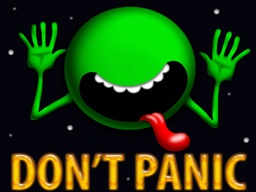 To those who ascribe to Dirk Gently’s belief in the fundamental interconnectedness of everything (the working premise that made him the holistic detective that he was), you might be able to tie together today’s rambling post. If you do, feel free to explain it to me. My Sherlockian approach failed miserably in the attempt. I got to the point where, once I had eliminated the impossible, whatever remained, however improbable, must be the truth. Except what remained was still impossible.
To those who ascribe to Dirk Gently’s belief in the fundamental interconnectedness of everything (the working premise that made him the holistic detective that he was), you might be able to tie together today’s rambling post. If you do, feel free to explain it to me. My Sherlockian approach failed miserably in the attempt. I got to the point where, once I had eliminated the impossible, whatever remained, however improbable, must be the truth. Except what remained was still impossible.
(I wrote about the Gently books here and the television miniseries here. Go ahead and read them. You know you want to.)
And since I’m talking about a mega-successful series, that has sold/rated well in almost every medium short of Mime, you don’t get a Spoiler Alert. If you’re not familiar with Adams’ works, I don’t know why you’re reading this post anyways. Go read/watch/play/listen to some incarnation of this stuff.
Dirk Gently’s Holistic Detective Agency is my favorite Douglas Adams book (many folks would like me to explain how that could be!). But I first came to Adams’ just like everybody else: through The Hitchhiker’s Guide to the Galaxy. Note I use the unhyphenated spelling.
I wouldn’t tackle that controversy without downing at least two Pan Galactic Gargleblasters first. And since I would lose consciousness two swallows into the first one, we can put that issue to bed right now. And I don’t mean on one of the follopping mattresses from the swamps of Sqornshellous Zeta, either. There.
Now we can move along. Though if you want to delve deeper into the issue on your own, see Don’t Panic: The Official Hitchhiker’s Guide to the Galaxy Companion by Neil Gaiman – pages 50-51.
I think that fact that there are five books in the Hitchhiker’s Guide trilogy says a lot. Except, of course, for the fact that in 2009 (Adams had passed away in 2001) Eoin Colfer wrote an authorized sixth book.
The books came after the radio series. Actually, they were written during the radio series. Of which there were two of those: that’s three books and two radio series, containing twelve episodes. We’ll leave out plays, movies, further radio series and television series for now. Quite possibly altogether.
Guide Entry: Hitchhker’s Guide to the Galaxy (Trilogy) – An improbably growing series of novels published by Pan Books. Related Entry: Pan Books
The Hitchhiker’s Guide to the Galaxy, The Restaurant at the End of the Universe, Life, The Universe and Everything, So Long, and Thanks for All the Fish, Mostly Harmless (all written by Douglas Adams) and And Another Thing (by Eoin Colfer). As a trilogy implies three: rather, it more than implies, it requires, therefore, demands three; the Hitchhiker’s Guide to the Galaxy Trilogy cannot be six books, therefore, it does not exist. Therefore, there is no trilogy and if you ask about it again, the Guide will simply reboot itself.
Pan Books – Not one of the great publishing corporations of Ursa Minor. In fact, it was so minor it was relegated to Earth, which as is/was/will be well known, was mostly harmless. It was, however, acquired by galactic reporter Trillian Astra and renamed PanMacMillan.
How one publishing house could include Jane Austen, Leslie Charteris and Joan Collins on their roster is a puzzler. In fact, after calculating the improbability factor, the Heart of Gold’s improbability drive actually blew a rod trying to restore normalcy. It is still in the shop for repairs. The most recent inquiry to the shop received an update of “Should be tomorrow at lunch, though six weeks from next Wednesday sounds likely too. Don’t call back.”
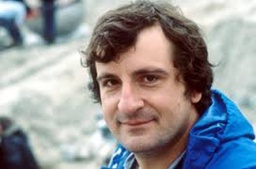 Got your towel? All right. I’ve recently re-read all five books Adams wrote in the increasingly misnamed trilogy and I am listening to Colfer’s book as an unabridged CD.
Got your towel? All right. I’ve recently re-read all five books Adams wrote in the increasingly misnamed trilogy and I am listening to Colfer’s book as an unabridged CD.
The generally agreed upon story is that Douglas Adams was hitchhiking across Europe in 1971. He was quite unsuccessful at this and found himself lying in a field in Innsbruck one night. He had a copy of The Hitchhiker’s Guide to Europe because Europe on Five Dollars a Day was out of his financial class. Staring at the stars, he thought about a guide to the galaxy for hitchhikers.
Five years later he had gone to Cambridge and also failed to establish himself as a writer and producer, though he had done a lot of writing with then massively popular Monty Python member Graham Chapman. Nothing came of it all and he was struggling. He even had to move back in with his mom.
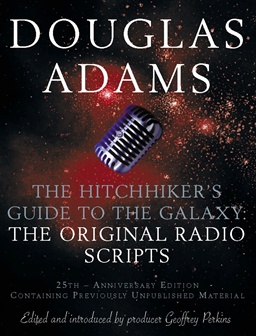 To oversimplify, he got a break by being introduced to BBC radio producer Simon Brett and pitching a comedy science fiction show (he actually pitched it for television, but ended up over at radio).
To oversimplify, he got a break by being introduced to BBC radio producer Simon Brett and pitching a comedy science fiction show (he actually pitched it for television, but ended up over at radio).
A pilot radio episode was made. To the BBC’s surprise it was popular and six episodes were eventually commissioned. The book deal was struck with Pan, additional radio episodes were ordered, Adams became a script producer for Tom Baker’s Doctor Who (writing three scripts himself – one of which became the famous ‘lost’ Shada episode. There was a strike and it was never filmed, though years later it was novelized.).
The radio series was very popular. And the trilogy of books, which were almost, but not quite, entirely unlike the radio scripts, were best sellers. The first book was a reworked version of the first four radio episodes. The second book was the same as the radio episodes in the way that your bathtub is the same as Lake Erie: both are full of water and both will make you wet. But come now: do you really want to argue they aren’t different?
It covered radio episodes seven through twelve, and five and six. And by the time the third book came out, it not only contradicted the final six episodes of the radio series (which had been in the second book), it stood in open defiance of them.
We’ve now reached a point where if there was a Babel Fish that translated logic, rather than language, even that couldn’t help us sort all this out. So we’ll just move along as if we were being pursued by the Ravenous Bugblatter Beast of Traal (RBBBT).
Guide Entry – If you’ve been chased by the RBBBT, you indeed should be moving quite quickly. Though, in point of fact, in an instance of such pursuit, unless you happened to have a Vogon’s grandmother handy to throw to the RBBBT, you are probably dead. And if you did have a Vogon’s grandmother handy, and you did throw her to the RBBBT, affecting your escape, you avoided an imminent, fatal threat. Congratulations. Now, however, you have a problem with an angrier than usual Vogon. And you know what that means: poetry. Sucks to be you.
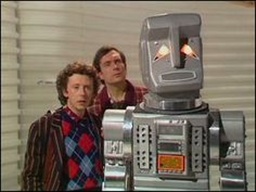 There was an early eighties BBC television miniseries, which I bought on VHS tape. It seems particularly cheesy to me now and is similar in look to the Doctor Who and Red Dwarf shows of the time. It was fairly faithful to the radio shows.
There was an early eighties BBC television miniseries, which I bought on VHS tape. It seems particularly cheesy to me now and is similar in look to the Doctor Who and Red Dwarf shows of the time. It was fairly faithful to the radio shows.
In 2005, the long-delayed movie project came to fruition and Martin Freeman (known for The Office but not yet immensely popular for Sherlock and The Hobbit), starred as Arthur Dent in a big budget production. I don’t know too many fans of the film. I watched it again for this post and found I liked it more the first time. It wasn’t particularly funny nor clever. It needed much more of Marvin, voiced perfectly by the late Alan Rickman. Frankly, I’d rather watch Galaxy Quest again for some laughs.
Now then: what we’ve got are the original first two series’ of radio episodes, four books by Adams and one by Colfer, a couple plays, a tv series, a movie and a couple of audio recordings (on LP) back when. And three more series’ of radio episodes, adapted from the third, fourth and fifth books. Oh! And of course, Infocom’s text-based Hitchhiker’s Game (frustrating, but fun).
Unlike in the Sherlock Holmes world, where you’ve got Doyle’s sixty original stories and everything else flows out of that, there isn’t exactly a “base Hitchhiker’s Guide” to work from. Adams was creating the radio series and first three novels himself (with a bit of help), and they’re both ‘authentic.’
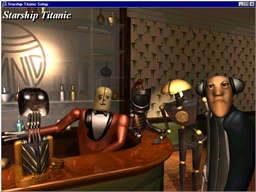 So…I’m simply, unless otherwise noted, going to be referring to the five novels, because I own them and I’m familiar with them. And also because Adams, who was HORRIBLE at meeting deadlines, had a little more time to edit and revise the books (though he didn’t do well at deadlines for those, either), than he did for the first two radio series, where they were literally recording one part while he finished the script for the next part. Reminds me of the Epstein brothers cranking out pages for Casablanca the same day shooting was going on the previous pages.
So…I’m simply, unless otherwise noted, going to be referring to the five novels, because I own them and I’m familiar with them. And also because Adams, who was HORRIBLE at meeting deadlines, had a little more time to edit and revise the books (though he didn’t do well at deadlines for those, either), than he did for the first two radio series, where they were literally recording one part while he finished the script for the next part. Reminds me of the Epstein brothers cranking out pages for Casablanca the same day shooting was going on the previous pages.
The Starship Titanic was a footnote in Life, The Universe and Everything. After a period in what several different industries term ‘development hell, it became a computer game which Adams was heavily involved with. There was also a novel adapted by Stephen Jones. The game and the book had nothing to do with the Hitchhiker’s universe. I do think that fans of the series should give the book a try, as it is in the Adams style. But it’s not something on my re-read list.
Colfer’s Book
One thing about the five books Adams wrote: they were understandable, even if they only made sense most of the time. Like the stuff with Agrajag, the entity who keeps being reincarnated, only to be (mostly accidentally) killed by Arthur every time. It’s funny. And it’s clearly explained. But it has nothing to do with the storyline. It could have been left out with no change to the book or the series. Not to say that it should have been: as I said, it’s funny.
But I’m almost halfway through Colfer’s And Another Thing and I have absolutely no idea what is going on, why whatever might be going on is going on, if in fact it is going on, or whatever may or may not be going on, is supposed to be going. So, I haven’t understood most of it and just about none of it makes sense. It is written in Adams’ style, but that’s not nearly enough to make this thing work so far.
The Point Being?
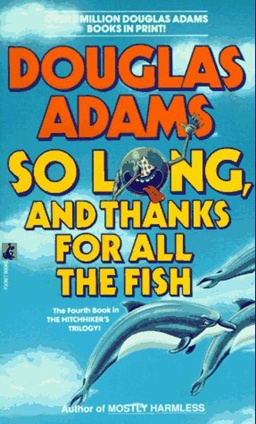 That leads me to the basic point that led me to write this post (assuming there is any point in all of this). I am a huge fan of Terry Pratchett’s Discworld series. I think they’re hilarious social commentary. Each of his books not only makes me laugh, but each is an actual story, with a plot. It starts somewhere and finishes at a logical point somewhere else.
That leads me to the basic point that led me to write this post (assuming there is any point in all of this). I am a huge fan of Terry Pratchett’s Discworld series. I think they’re hilarious social commentary. Each of his books not only makes me laugh, but each is an actual story, with a plot. It starts somewhere and finishes at a logical point somewhere else.
I’ve read and/or listened to audiobooks of the Hitchhiker’s Guide series at least ten times over the years. I thoroughly enjoy it (although So Long and Thanks for all the Fish is a bit pointless). But there isn’t much of a story in parts.
In the first novel, the earth is destroyed, Arthur and Ford bounce around (mostly with Zaphod and Trillian), find a planet-building world named Magrathea and narrowly escape at the end and decide to grab lunch. That’s it. So what? What was the point?
In the second book, they dine, leave the restaurant, barely escape a ship that is plunging into the sun for a rock concert special effect, and the party splits up. There’s lots more funny stuff (love Ark – B), but at the end of the book, no idea what’s supposed to be going on as far as a central plot goes.
In the third and not final book of the trilogy, it does all come together. In a way. Earth is saved and we have an explanation for the sport of cricket. Kind of. But I think what I’m saying is that I read Douglas Adams for his writing style and his humor. His ability to fashion a coherent story is not a strong point. And it’s rare that I re-read something that isn’t a logical story within its parameters. But I keep coming back to Adams.
Adams himself said that he “wrote it (the whole thing) serially so I was never sure where it was going. And no matter how frantically I’d plot it out, it would never adhere to the plot I had mapped out for it. After a while, it became pointless plotting too far in advance, since it never worked.”
Book four was written mostly so that Adams could make more money. And maybe just a little because he wanted to do something nice for Arthur and even (in an Eyeore-type of way), for Marvin the miserable robot.
Guide Entry – Deadline: So Long and Thanks for all the Fish – Douglas Adams never met a deadline he…actually, that is it. He never met a deadline. With the success of the first three novels, it was Adams’ idea to write a fourth. He received a froody advance then promptly failed to write the book. This was disturbing to the folks at Pan (remember them?), as they had, rather foolishly, already knowing what Adams was like, planned an expensive, elaborate publicity campaign.
This was a flawed plan from the start, because, of course, it required said book. And with a few weeks remaining before printing, Adams had written about 25 pages. The only solution happened to be the most logical one. A hotel suite was booked, Adams was installed and locked away and he completed So Long and Thanks for all the Fish.
It should be noted that this method was also required to complete the fifth book, Mostly Harmless. Thus further proving the publishers’ lament, the only problem with putting out a book is that you need an author to write it. Related Entry: see Deadlines – monkeys.
Deadlines: monkeys – The publishing house of Begattus Miranus thought that they had solved the author/deadline problem by having a thousand monkeys typing away at keyboards. The first missed publication date was because it took two years of training to get the monkeys to quit throwing their feces all over the room. The second missed publication date occurred because the monkeys unionized. The project was finally abandoned when the union representative demanded hourly banana breaks, two ply toilet tissue and an aggressive gender equity policy (they wanted female monkeys hired. Preferably by the barrel).
And I guess that will about do it. I mentioned Neil Gaiman’s Don’t Panic, which is a relatively short and quick read that will give you a pretty good picture of the whole Hitchhiker’s thing up to 1988.
 I’ve only browsed through The Frood: The Authorized and Very official History of Douglas Adams & the Hitchhiker’s Guide to the Galaxy by Jem Roberts. This came out in 2014 and will take you quite awhile to read.
I’ve only browsed through The Frood: The Authorized and Very official History of Douglas Adams & the Hitchhiker’s Guide to the Galaxy by Jem Roberts. This came out in 2014 and will take you quite awhile to read.
If you like Adams, I can’t recommend Terry Pratchett’s Discworld enough. Think of his stuff as Hitchhiker’s in a fantasy world. But it ‘s much, much more. I think that Pratchett was one of our generation’s great satirists. And with Neil Gaiman, he co-wrote a hysterical look at the apocalypse, Good Omens.
I’ve not seen any of the television series,’ but the first two Red Dwarf books are very Hitchhiker-like and quite fun.
And of course, you’ve got the five Adams books, the Colfer sequel, the two Dirk Gently novels from Adams and the third unfinished one, contained in The Salmon of Doubt.
So, get your towel and Don’t Panic!
And do let me know if you come up with the question for the answer ’42’…
You can read Bob Byrne’s ‘The Public Life of Sherlock Holmes’ column here at Black Gate every Monday morning.
He founded www.SolarPons.com, the only website dedicated to the ‘Sherlock Holmes of Praed Street’ and blogs about Holmes and other mystery matters at Almost Holmes.
His “The Adventure of the Parson’s Son” is included in the largest collection of new Sherlock Holmes stories ever published. Surprisingly, they even let him back in for Volume IV!
Having been there since the original radio series first hit NPR, that first (or first two) series really hit the target for me the way that all the print, LP and TV/movie versions never have; they have an energy and elliptical loopiness that clearly could only come from being scripted largely on pub napkins. The good news is that they’re readily available on CD or via Audible…although some of the jokes from the original broadcasts have been edited out, thanks to annoying copyright issues (musical references mainly) that the BBC broadcast never troubled itself with.
I also found So Long and Thanks for All the Fish a bit “tacked on”. Enjoyed it and the series is one of the few I have re-read a few times but it still feels a bit off. Mostly Harmless, I recall a friend saying when it came out, paraphrased as working from distant memory “This is his kill Arthur Dent book. He is so tired of people asking for more that this one is the definite end!” that said I liked it, perhaps more than so long. One book of Adams I really should obtain and read is Almost Gone. While I doubt it is funny, wacky, zany or froody, I have heard it’s pretty good.
Back to Mostly Harmless, Conan Doyle is well know for eventually detesting his creation (Holmes), I wonder how Adams felt about Dent?
Pratchett wise, glad he found his niche in fantasy as his Sci-fi work which I had hoped would be like Adams (Dark Side of the Sun, Strata) while clever in some ways left me relatively cold.
Tiberius – Actually, there’s some pretty good observational humor in Almost Gone. It was a pleasant read.
[…] (Here’s the Black Gate post) […]
Phubarrh – I’ve never heard the radio shows. I plan on getting the book of the scripts somewhere down the line.
I was a fan of the original radio series, which was paired with the radio adaptation of Star Wars that actually drew my attention initially. And I would recommend the transcripts of the radio series, especially for the notes to each episode that Mr. Adams attached. The story behind the (in)famous whale and bowl of petunias is a sharp indictment of gratuitous violence in popular entertainment.
Reading Jem Roberts’ exhaustive bio of Douglas Adams.
This thing is information packed and a muse read if you want to learn about Adams’ life.
But it’s also such dense reading it’s almost like an encyclopedia, than a biography. It’s full of great stuff, but a bit of a chore to work through.
https://www.amazon.com/Frood-Authorised-Official-History-Hitchhiker%C2%92s/dp/009959076X?ie=UTF8&ref_=asap_bc
[…] at BlackGate.com, you are probably aware that I am a huge fan of Douglas Adams. While I really like The Hitchhiker’s Guide books, Dirk Gently’s Holistic Detective Agency is my […]
A nice, roundabout Hitchhiker/Holmes connection is that Simon Jones (Arthur Dent) starred in Dirk Maggs’ “The Adventures of Sexton Blake” radio series, which includes Mrs. Hudson as the housekeeper for a certain other detective on Baker Street. This was done in 2009, smack dab in-between Maggs’ productions of the “Quintessential Phase” of the Hitchhikers radio series and its “Hexagonal Phase.”